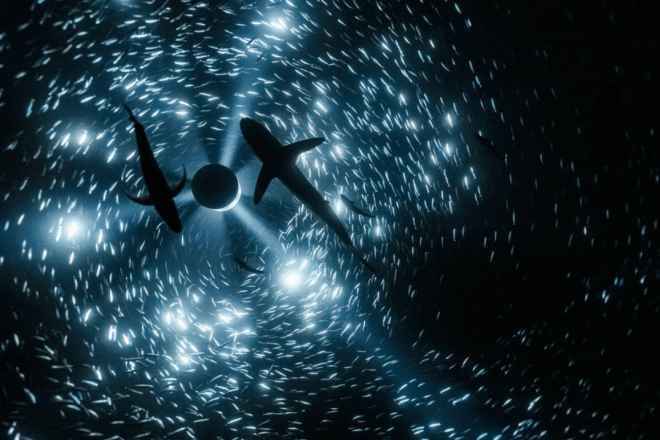
Internationally acclaimed artist Julian Charrière, known for his thought-provoking explorations of human interactions with natural environments through film, sculpture, and photography, presents Midnight Zone, his latest video installation, at the Museo de Historia Natural y Cultural Ambiental, thanks to the generous support of Fundación Coppel. Curated by Pedro Alonzo, this groundbreaking installation, drawing from our imaginaries of the deep sea, environmental science, and art as an interpretation of reality, features a mesmerizing video projection and will be open to the public starting February 4 until March 9, 2025.
At the heart of Midnight Zone lies a custom-designed Fresnel lighthouse lens, an object that has long been symbolic of the boundary zone between the oceanic and terrestrial. Doubling as a diving bell, the lens makes a symbolic descent into the water column above the Clarion Clipperton Fracture Zone, casting an urgent light on a region not only home to rich biodiversity but which is under the imminent threat of deep-sea mining for polymetallic nodules – mineral concretions containing the rare earth metals believed critical for the transition to green energies.
Transformed into an abyssal dream machine, the lighthouse lens interacting with majestic sea creatures are the primary elements of the film, transporting us into a submerged landscape which has long lacked representation. Through an immersive cinematic journey, Midnight Zone invites viewers to confront the pressing realities of resource extraction while also celebrating the mysterious beauty and multiplicity of the deep sea. The large-scale video projection is a singular evocative experience; bringing a mesmerizing encounter with one of the least explored biomes on Earth to audiences in Mexico City. By merging art and environmental activism, Charrière emphasizes the role of emotional connection in the field of ocean conservation, specifically highlighting the ecological significance of the Sea of Cortez.